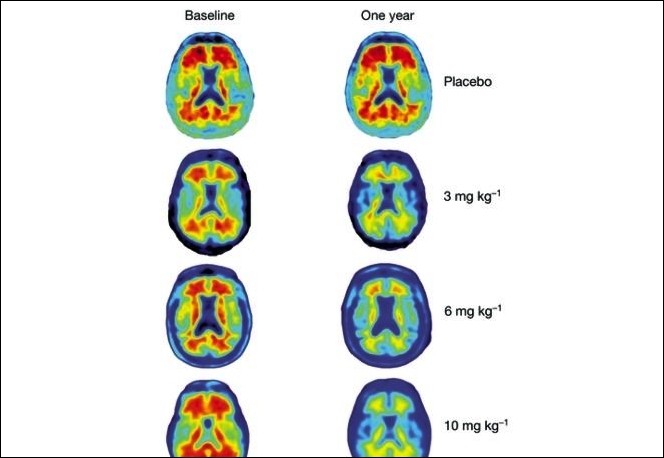An experimental drug called "aducanumab" made by Biogen, Inc. was found to have cleared plaque from the brains of early stage Alzheimer's patients
The results of this small sample study is being hailed by some researchers, who call it the most promising yet in the fight against Alzheimer's, a disease that doesn't have a cure. The trial suggests it might be possible to clear the brain of the amyloid protein characteristic of Alzheimer's.
Administered to patients in the trial once a month for a year, aducanumab cleared the brain of the plaque deposits believed to play a key role in disrupting cellular processes and blocking communication among nerve cells, the hallmarks of Alzheimer's disease.
The brains of Alzheimer's patients tend to have much more of these plaque deposits than others.
Researchers said it might take up to 20 years for plaque to have accumulated to the levels seen in patients, so the removal of plaque within a 12-month period "appears encouraging." While showing promise in human trials, Biogen's cognitive benefits haven't been proven, however.
Biogen, which is based in Cambridge, Massachusetts, developed aducanumab and funded the study.
The study, however, primarily tested its safety in humans and wasn't designed to test for cerebral benefits in patients. The condition of some patients who received the drug showed less decline than patients receiving a placebo, which surprised researchers.
The study involved only 165 participants that were divided into groups and treated with monthly intravenous infusions of either aducanumab or a placebo over 54 weeks. Four groups of patients received the drug in four separate doses.
PET brain scans revealed that treatment with aducanumab reduced brain plaques based on both duration and dose. All groups showed more reduction in plaques over time, and the highest-dose group showed the greatest reduction of all.
While some experts noted the study had too few patients to prove the drug actually works, confirmation of a cognitive benefit would be a game-changer.
"This is the best news we've had in my 25 years of doing Alzheimer's research," said Stephen Salloway, a professor of clinical neurosciences and psychiatry at Brown University and a co-author of the paper.



























